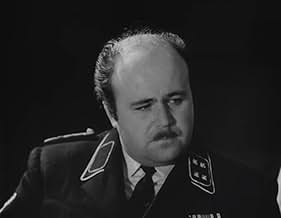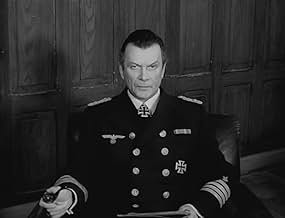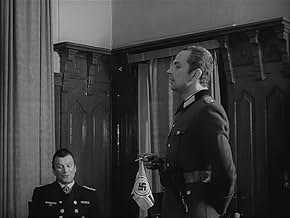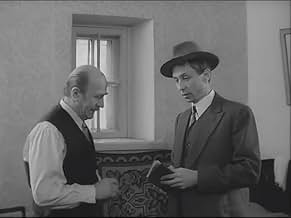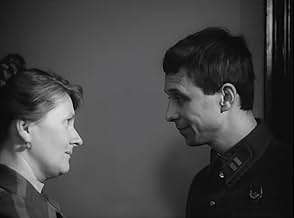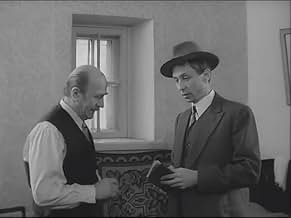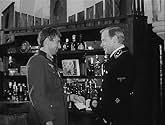Ajouter une intrigue dans votre langueIn basis of film is documentary material about the actions of soviet secret service in Tallinn occupied by hitlerites.In basis of film is documentary material about the actions of soviet secret service in Tallinn occupied by hitlerites.In basis of film is documentary material about the actions of soviet secret service in Tallinn occupied by hitlerites.
Parcourir les épisodes
Histoire
Le saviez-vous
- ConnexionsReferenced in kuji: Konstantin Severinov: The Genetic Horoscope (2024)
Commentaire à la une
Historical drama. The film adaptation of the story "Operation Viking" by Soviet writers Nikolai Leonov and Yuri Kostrov, which, in turn, is based on real biographies of outstanding Soviet intelligence officers (for example, the prototype of the main character was clearly Soviet intelligence officer Alexander Demyanov (known in the Abwehr as "Heine"), if you want to know the details, then feel free to drive in Yandex "Operation Monastery", there are a lot of interesting things there). Meanwhile, the marathon of Soviet film intelligence officers of the Great Patriotic War is gradually coming to an end (there was a review for "Seventeen Moments of Spring"). But today's five-part picture was able to amaze me, deceive me, and very much involve me in the events taking place on the screen. And since I have not read the original book source, therefore I will evaluate the film adaptation as an independent work. And here is my brief opinion for you - the Tallinn "concert" of the Abwehr and the NKVD. I want to note right away that there are no shortcomings in the picture (after all, we will not consider a small discrepancy in technology and primitive shootings as shortcomings, right?!). Therefore, I will focus your attention on the expressive advantages of this masterpiece of Soviet military cinema.
So, here they are: 1. Scenario - In the spring of 1942, the head of the Abwehr, Admiral Canaris, rescues from disgrace an intelligent and experienced German spy, Baron von Schlosser, in order to rehabilitate himself in the eyes of Hitler for the failure of the 1941 company by establishing a communication channel with Moscow, where disinformation can be poured. Schlosser's efforts bring Captain Paul Krieger (aka Senior Lieutenant Skarin) to Tallinn with a particularly important task from the Center. Skorin's task is complicated by the fact that Schlosser is an extremely intelligent and calculating opponent, so Skorin will have to extract truthful information, but in an extremely dangerous way. And the Gestapo actively pokes its nose into this matter in the person of SS Sturmbannfuhrer Maggel, for whom Skorin is a very important bird who is able to promote him up the career ladder, well, the Iron Cross will not be superfluous. The stakes in this confrontation are high - after all, the Battle of Stalingrad is underway, on which the fate of not just two states, but the whole world depends, so also all participants in the operation walk on very thin ice, which can crack at any moment, and he will not give mercy to anyone. I was amazed by the story told from beginning to end. The finale was very pleasing, especially the fact that Skorin left a "surprise". Smart, resourceful and just brilliant. This is the script, this is the elaboration of characters and images. This is a worthy example to follow. Bravo!
2. Skorin and Schlosser's confrontation - both heroes are experienced and intelligent scouts, well-versed in empanitei, who are loyal to their country, and both wish victory over the enemy. Each of the heroes tries to outwit his opponent as much as possible and more convincingly and inventively, which is what they demonstrate to us throughout the whole picture. If you have watched at least a couple of pictures about intelligence, then most of the techniques will be familiar to you, and, accordingly, the methods of fighting too. Schlosser here reveals himself as a genius who succeeds in everything, but it turned out that even such a genius as Schlosser did not foresee some small details, and he even forgot about such aspects of human nature as rivalry, betrayal, meanness and envy, which in such a case as intelligence play a far from the last role, and history has proven this many times once. And Skorin surprised me with his composure and fortitude, without which there is nothing to do in intelligence. His long and subtle play on Schlosser's nerves and professionalism is commendable. And at the end, when he explained all his methods - I'm ready to applaud standing up, because the tips and the banal explanation were in our sight, we just had to look at the picture more carefully and analyze everything that was happening, because this is intelligence, in which every little thing is far from an accident.
3. Tallinn - the ancient capital of the Estonian SSR is presented in all its glory: narrow streets, medieval houses, sights, mansions of the nobility and so on. I have not yet had a chance to visit this ancient city (I was only in Vyborg from medieval cities), but I hope to be there one day and walk along the streets where the heroes of this picture walked. The panoramic views of the city are amazing, considering that everything was shot on black and white film, although I watched the restored version of the picture.
4. The atmosphere of war - despite the fact that there are no demonstrative executions or other atrocities in the picture (with the exception of the Gestapo scene) of the Fascist occupiers on our land, the atmosphere of the Great Patriotic War feels good, because between the scenes we are shown chronicles and messages from both the Soviet and German sides. Dialogues between officers of the Abwehr, the RSHA and other representatives of the occupiers make it clear the mood that prevailed at that time and precisely in that period of time, between the defeat at Moscow and the defeat at Stalingrad.
5. Outstanding actors - Elena Prudnikova (Lotta), Evgeny Evstigneev (Major of state Security Simakov), Irina Pechernikova (Skorin's wife) and so on. What can I say - the Soviet old school, which is no longer being done. This should be appreciated and an example of great acting should be taken from this.
A little about the main characters: 1. Gaumpan Paul Krieger (Senior Lieutenant Skorin) performed by Oleg Dahl is an experienced scout who has only recently returned from a dangerous mission and has not yet had time to heal his wounds, as he is again sent "to the other side", where he has to perform an even more dangerous task, but this time he will have to act almost openly, which can lead to death. Oleg Ivanovich struck me in this role, because I remember him from the roles of completely different people with a different character (Prince Florizel, for example), well, here he almost equaled Pavel Kadochnikov from the picture "The Scout's Feat". Bravo!
2. Baron von Schlosser, played by Igor Vasiliev, is an experienced German intelligence officer from a Prussian aristocratic family. Moreover, the baron is not a fan of fascism, but the oath forces him to serve the criminal regime. He manifests himself as an extremely dangerous opponent, whom to beat means to pass the most difficult exam in life. Igor Alekseevich was great, because I had not seen him before this picture. Bravo!
3. SS Sturmbannfuhrer Franz Maggil, played by Alexander Kalyagin, is the head of the Tallinn department of the Gestapo, who closely monitors Schlosser's operation and at the moment of his mistake is ready to intercept all control levers in order to soar up the career ladder. Not particularly far-sighted and not too smart, unlike Skorin and Schlosser. Alexander Alexandrovich here was able to surprise me with the talent of reincarnation. That's what mastery means! Bravo!
It is also worth praising the very high-quality restoration of the painting, which is why it was a pure pleasure to watch it. That's how you need to restore the classics!
My rating is 10 out of 10 and my recommendation for viewing!
So, here they are: 1. Scenario - In the spring of 1942, the head of the Abwehr, Admiral Canaris, rescues from disgrace an intelligent and experienced German spy, Baron von Schlosser, in order to rehabilitate himself in the eyes of Hitler for the failure of the 1941 company by establishing a communication channel with Moscow, where disinformation can be poured. Schlosser's efforts bring Captain Paul Krieger (aka Senior Lieutenant Skarin) to Tallinn with a particularly important task from the Center. Skorin's task is complicated by the fact that Schlosser is an extremely intelligent and calculating opponent, so Skorin will have to extract truthful information, but in an extremely dangerous way. And the Gestapo actively pokes its nose into this matter in the person of SS Sturmbannfuhrer Maggel, for whom Skorin is a very important bird who is able to promote him up the career ladder, well, the Iron Cross will not be superfluous. The stakes in this confrontation are high - after all, the Battle of Stalingrad is underway, on which the fate of not just two states, but the whole world depends, so also all participants in the operation walk on very thin ice, which can crack at any moment, and he will not give mercy to anyone. I was amazed by the story told from beginning to end. The finale was very pleasing, especially the fact that Skorin left a "surprise". Smart, resourceful and just brilliant. This is the script, this is the elaboration of characters and images. This is a worthy example to follow. Bravo!
2. Skorin and Schlosser's confrontation - both heroes are experienced and intelligent scouts, well-versed in empanitei, who are loyal to their country, and both wish victory over the enemy. Each of the heroes tries to outwit his opponent as much as possible and more convincingly and inventively, which is what they demonstrate to us throughout the whole picture. If you have watched at least a couple of pictures about intelligence, then most of the techniques will be familiar to you, and, accordingly, the methods of fighting too. Schlosser here reveals himself as a genius who succeeds in everything, but it turned out that even such a genius as Schlosser did not foresee some small details, and he even forgot about such aspects of human nature as rivalry, betrayal, meanness and envy, which in such a case as intelligence play a far from the last role, and history has proven this many times once. And Skorin surprised me with his composure and fortitude, without which there is nothing to do in intelligence. His long and subtle play on Schlosser's nerves and professionalism is commendable. And at the end, when he explained all his methods - I'm ready to applaud standing up, because the tips and the banal explanation were in our sight, we just had to look at the picture more carefully and analyze everything that was happening, because this is intelligence, in which every little thing is far from an accident.
3. Tallinn - the ancient capital of the Estonian SSR is presented in all its glory: narrow streets, medieval houses, sights, mansions of the nobility and so on. I have not yet had a chance to visit this ancient city (I was only in Vyborg from medieval cities), but I hope to be there one day and walk along the streets where the heroes of this picture walked. The panoramic views of the city are amazing, considering that everything was shot on black and white film, although I watched the restored version of the picture.
4. The atmosphere of war - despite the fact that there are no demonstrative executions or other atrocities in the picture (with the exception of the Gestapo scene) of the Fascist occupiers on our land, the atmosphere of the Great Patriotic War feels good, because between the scenes we are shown chronicles and messages from both the Soviet and German sides. Dialogues between officers of the Abwehr, the RSHA and other representatives of the occupiers make it clear the mood that prevailed at that time and precisely in that period of time, between the defeat at Moscow and the defeat at Stalingrad.
5. Outstanding actors - Elena Prudnikova (Lotta), Evgeny Evstigneev (Major of state Security Simakov), Irina Pechernikova (Skorin's wife) and so on. What can I say - the Soviet old school, which is no longer being done. This should be appreciated and an example of great acting should be taken from this.
A little about the main characters: 1. Gaumpan Paul Krieger (Senior Lieutenant Skorin) performed by Oleg Dahl is an experienced scout who has only recently returned from a dangerous mission and has not yet had time to heal his wounds, as he is again sent "to the other side", where he has to perform an even more dangerous task, but this time he will have to act almost openly, which can lead to death. Oleg Ivanovich struck me in this role, because I remember him from the roles of completely different people with a different character (Prince Florizel, for example), well, here he almost equaled Pavel Kadochnikov from the picture "The Scout's Feat". Bravo!
2. Baron von Schlosser, played by Igor Vasiliev, is an experienced German intelligence officer from a Prussian aristocratic family. Moreover, the baron is not a fan of fascism, but the oath forces him to serve the criminal regime. He manifests himself as an extremely dangerous opponent, whom to beat means to pass the most difficult exam in life. Igor Alekseevich was great, because I had not seen him before this picture. Bravo!
3. SS Sturmbannfuhrer Franz Maggil, played by Alexander Kalyagin, is the head of the Tallinn department of the Gestapo, who closely monitors Schlosser's operation and at the moment of his mistake is ready to intercept all control levers in order to soar up the career ladder. Not particularly far-sighted and not too smart, unlike Skorin and Schlosser. Alexander Alexandrovich here was able to surprise me with the talent of reincarnation. That's what mastery means! Bravo!
It is also worth praising the very high-quality restoration of the painting, which is why it was a pure pleasure to watch it. That's how you need to restore the classics!
My rating is 10 out of 10 and my recommendation for viewing!
- lyubitelfilmov
- 29 avr. 2023
- Permalien
Meilleurs choix
Connectez-vous pour évaluer et suivre la liste de favoris afin de recevoir des recommandations personnalisées
Détails
- Durée6 heures 10 minutes
- Couleur
- Mixage
Contribuer à cette page
Suggérer une modification ou ajouter du contenu manquant

Lacune principale
By what name was Variant 'Omega' (1975) officially released in Canada in English?
Répondre
